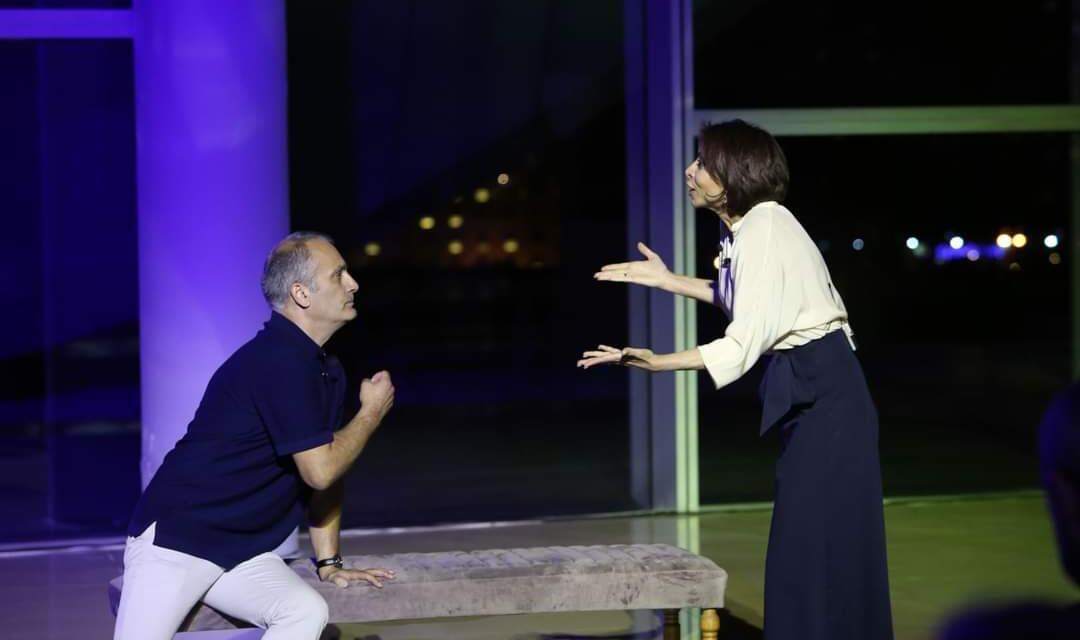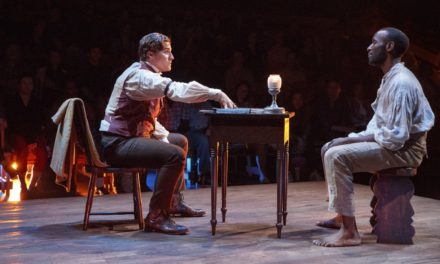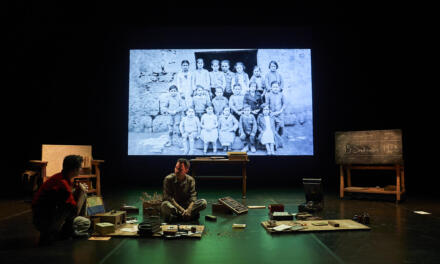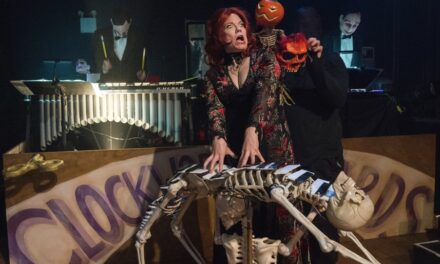The smooth curves of the fancy building, with no sharp angles, were embraced by the spicy Baku evening. Its huge transparent windows, penetrated by the light of the bright sun, reflected the evening haze. The heat gave way to coolness. Blinding light is replaced by cozy semi-darkness. The bustling hum of the day is replaced by gentle music and supplies the perfect atmosphere for memories. For one’s own, or someone else’s. The performance, A Place of Comfort in the Square by director Tarlan Rasulov, became a voyage on the waves of memory. The premiere performance was held at The Heydar Aliyev Center, designed by Iraqi-British architect Zaha Hadid. It is a rare case, when a chamber performance is not lost in the spacious space, but transforms it into a cozy, intimate world of memories and revived pages of prose of the outstanding Azerbaijani author Magsud Ibrahimbeyov.

A Place of Comfort in the Square Photo by Vugar Imanov.
Magsud Ibrahimbeyov is a cult figure in Azerbaijani literature. The author of several dozens of books, plays, and movie scripts, he is truly the People’s Writer of his country. He is an Ambassador for Peace and a candidate for the Nobel Prize for literature. His books have been translated into thirty-six languages. He was also a very kind man, remembered to this day with gratitude and heartfelt smiles. In his house-museum in the Old City of Baku, plays are staged, literary evenings are held, and everyone is welcomed as a dear guest. It is more of a house than a museum. The muse and widow of writer Anna Ibrahimbeyov has fine taste and a gift with discerning the talent and spiritual gifts of others. She is in every way trying to preserve the heritage of her husband and strives to find the best artists, whom she trusts to compose and implement one or another creative project based on the prose of Magsud Ibrahimbeyov.
The play A Place of Comfort in the Square is based on three stories by the writer, adapted for the stage by the famous Azerbaijani playwright Ismail Iman. The literary texture of the play flows easily, and even knowing the original text, it is difficult to determine where one story ends and the next begins. Ibrahimbeyov’s dialogues are simple, light, worldly, but this simplicity is true. Despite the flair of the 1960s and ’70s, the play manages to overcome the distance of time. The spectators are immersed in a world of other people’s stories, becoming eyewitnesses, good neighbors, or distant relatives of the characters.
There are two He and She on stage. But there is also a third character. At the Grand Piano. He is both a character and the author’s emissary and composer. A Place of Comfort in the Square is the acting debut of world-renowned pianist Shahin Novrasli. Initially invited to the performance as a composer and accompanist, thanks to the special method of director and teacher Tarlan Rasulov, Shahin Novrasli managed to reveal himself in a new light. And it is difficult to believe that this is his debut; so organically and charmingly he exists in this play. Not so much playing along, rather more playing on a par with professionals popular with Azerbaijan actors – the charming and emotional Melek Abbaszade and the thoughtful performer of high concentration Elsan Rüstamov.
The “with/out play” method practiced by Tarlan Rasulov not only allows turning a non-professional actor into a theatre performer but also helps professional actors get rid of clichés and templates accumulated during years of their profession. The performance does not seek to intonize the text, saturate it with gags or theatricalize it. On the contrary, here they strive to achieve harmony between the music of the word and the music inspired by the word. It is amazing how the intonation of Ibrahimbeyov’s prose is transposed into notes, and how, at times, the actors improvise, transcending the limits of the literary text. The written word becomes the living word.
A Place of Comfort in the Square is the seemingly traditional story of a man and woman who love each other, quarrel, make peace, remember and curse, talk about trifles and the most intimate things. In short, this story is about how life is lived. But it is amazing how in a few phrases or strokes the time and place appear in it – Baku in the middle of last century, which even today is not defeated by the accelerated pace of time. There is no stylization, no period costumes, no scenery. There is only a piano and a bench. The actors take to the improvised stage right from the auditorium. And it turns out that the heroes of Ibrahimbeyov are each of us. There is no distance between them and us.
Some phrases referring to the past sound more relevant today than ever. “Every day we played war, and somewhere there was a real war, and we heard about it from adults, but it never seemed terrible to us… And then…” – it seems to be written today, in our days, again illuminated by the bloody light of military conflicts. Or else: “The adults listened to the radio, read the newspapers… And everyone was waiting for good news…”
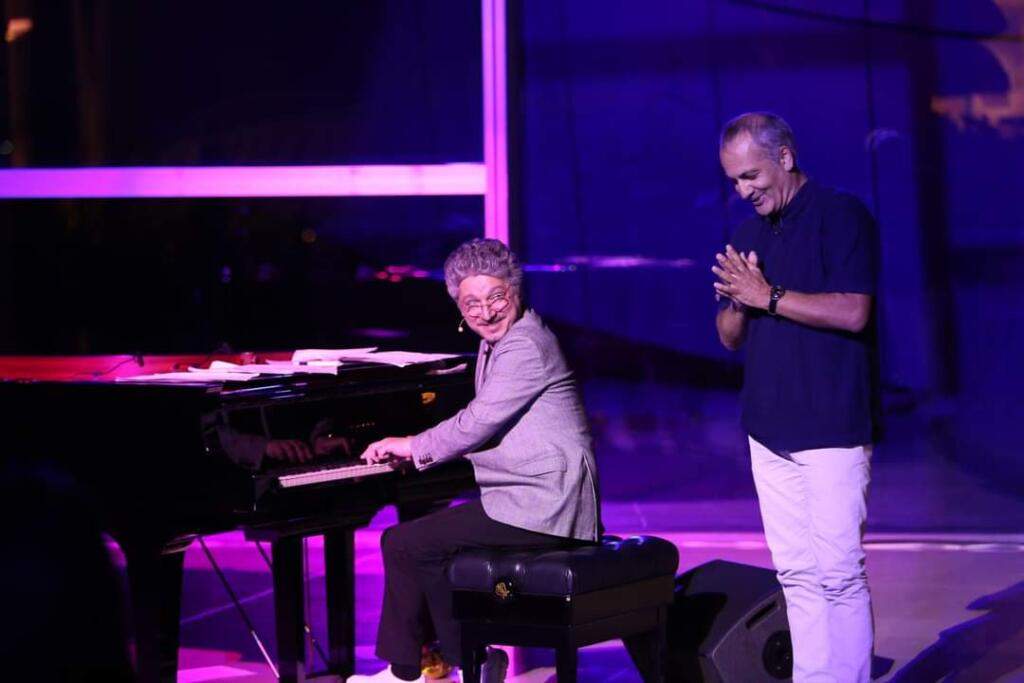
A Place of Comfort in the Square Photo by Vugar Imanov.
In the director’s mind, A Place of Comfort in the Square is a garden of memories. At the same time, this garden is brought to life by each of the audience with their memories, getting rid of the deadness within themselves. It is a play about time, in which two realities meet – our day and our past. There was a line in an old song: “All that was not with me, I remember”… This is a performance about the memory of the heart and, of course, about love. One of the most striking plastic scenes of the performance is played with the single palms of the two characters, who intertwine, caress each other in the air, strive, stretch, but never touch, as in the fresco The Creation of Adam by Michelangelo. It is striking that all three actors have very expressive hands, and gestures, which are an invaluable aspect of the performance. The hands here also speak to the audience, expressing what the author has between the lines. As the poet said, “You are mine” only hands can say”…

A Place of Comfort in the Square Photo by Vugar Imanov.
The premiere of the performance was preceded by a presentation of the book about Magsud Ibrahimbeyyov titled Maksud Forever. This title is echoed by the play, which confirms the contemporaneity, or rather timelessness, of the author’s texts. Because love, sorrow, sincerity, mercy, and compassion have no expiration date. Some of the symbols of the performance are sheets of paper. It’s as if the fragments of the writer’s manuscript, which he left when he left us, and the actors picked them up, read, and lived in them. The white leaves scattered on the black piano are the autumn of life, the leaves of memory, and a reminder that one should live one’s life in such a way that it becomes a story worth telling. What is needed to do this? The play has the answer: “And remember, the most important thing is diligence and attention…”
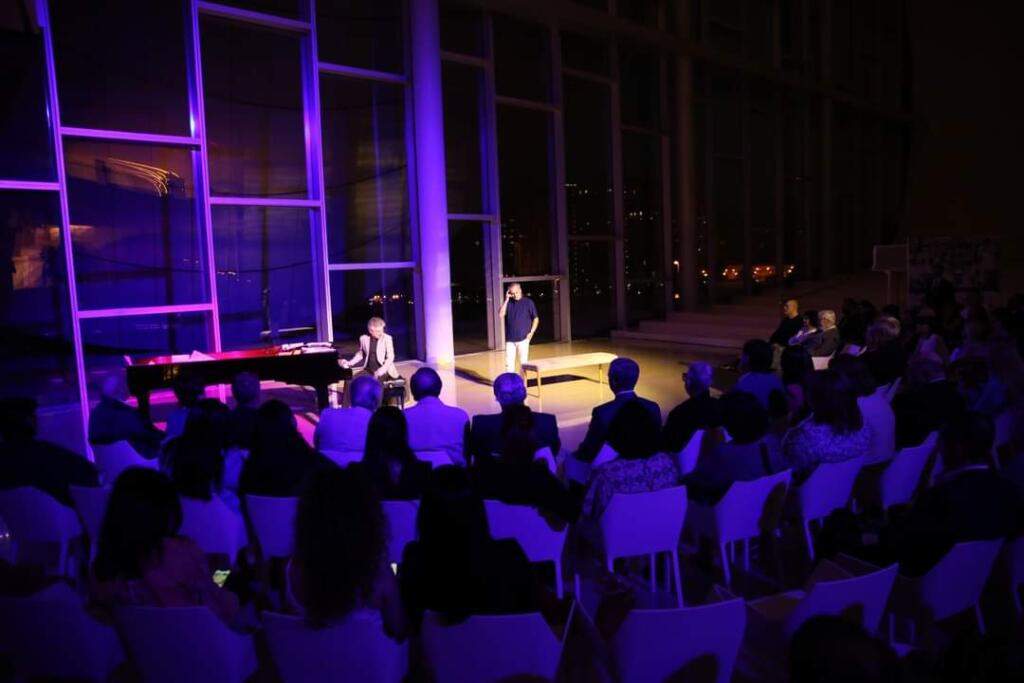
A Place of Comfort in the Square Photo by Vugar Imanov.
Video https://youtu.be/yW3QaHPWqT0
This post was written by the author in their personal capacity.The opinions expressed in this article are the author’s own and do not reflect the view of The Theatre Times, their staff or collaborators.
This post was written by Seyyare Khalfina.
The views expressed here belong to the author and do not necessarily reflect our views and opinions.

